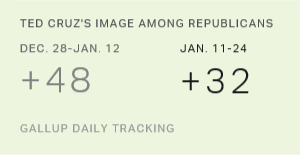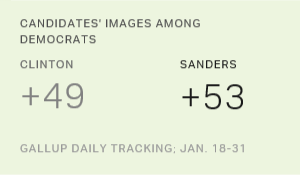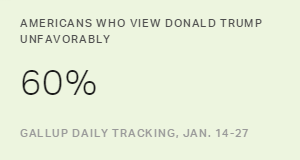Story Highlights
- Six in 10 in U.S. prefer candidate who agrees with them on issues
- One in three prefer candidate with best chance of winning
- Democrats, Republicans share these preferences about equally
WASHINGTON, D.C. -- Americans are about twice as likely to prefer that their party nominate a candidate who agrees with them on almost all the issues they care about but does not have the best chance of winning, rather than one who has the best chance of winning but doesn't agree with them on the issues they care about. Republicans and Democrats have similar preferences.
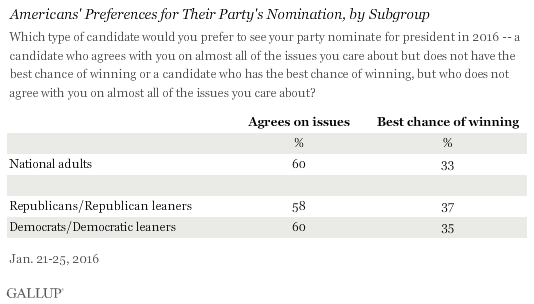
The issue of the importance of a candidate's electability has been hotly discussed in the 2016 presidential election campaign, as establishment candidates who were widely perceived as the inevitable party nominees have been formidably challenged by political outsiders or politicians who operate mainly outside the party establishment. Democrats and Democratic-leaning independents, and Republicans and Republican-leaning independents, share the preference for a nominee who is more agreeable to them on the issues than for someone who is more likely to be elected.
Within the Democratic Party, many Hillary Clinton supporters argue that Sen. Bernie Sanders, perhaps because of his embrace of socialist ideals, could not win a general election contest. Gallup found in June -- prior to Sanders' rise in support -- that Americans were least likely to support a socialist among hypothetical presidential candidates with certain characteristics. It is unclear whether those views have changed in light of Sanders' success to date. Sanders' supporters, however, take issue with many of Clinton's previous votes and positions, such as her vote to authorize military action against Iraq in 2003.
Meanwhile, many GOP leaders are reeling from the surprising rise of Donald Trump as well as the Iowa victory of Sen. Ted Cruz, who has a troubled relationship with many in his party. Many question whether these candidates would be able to win a general election despite their relative popularity among Republican voters. Apparently, as these data would suggest, Republicans have been focused more on these candidates' positions on the issues than on their electability.
Adults Under 30 Far More Likely to Seek Issue-Agreeable Party Nominee
While Americans of all age groups prefer a candidate who largely agrees with them on the issues they care about, the percentage who have this preference is much higher among voters younger than 30. Between 46% and 59% of adults aged 30 or older are focused on issue agreement, compared with 82% of younger adults -- those 18 to 29.
This disparity among age groups is revealing of the rift between Clinton and Sanders supporters in the debate over electability. While Clinton's base is generally older, and older Americans are more likely to say they prefer a candidate with greater ability to win, Sanders boasts a stronger rapport with younger adults, who are more likely to prefer a candidate who is most agreeable, issue-wise.
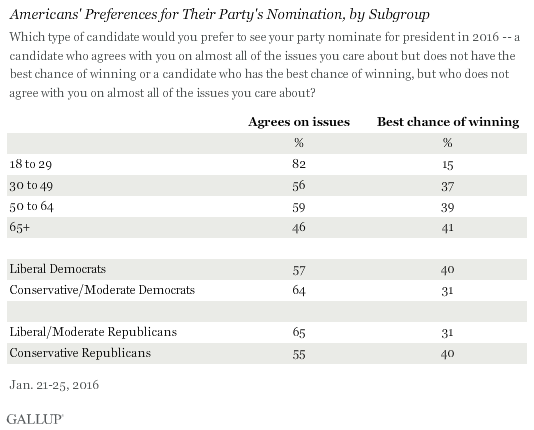
The poll also suggests that moderates within both political parties value issue agreement over electability compared with the more ideological wings of each party's base.
Preference for Issue-Agreeable Nominee Is Reminiscent of the 2012 Election
Americans' current preference for nominees who agree with them on the issues is not dissimilar to what it was in December 2011. As Republican presidential candidates entered the 2012 primary season to determine who would face President Barack Obama, two in three Americans said they preferred a party nominee who agreed with them on almost all issues -- a slightly higher percentage than the current figure.
The figure hasn't changed much for Republicans, who also had a large field of candidates to choose from in 2012. For Democrats, the issues-versus-electability debate may have been a moot point that year because they enjoyed the advantage of having an incumbent president from their party.
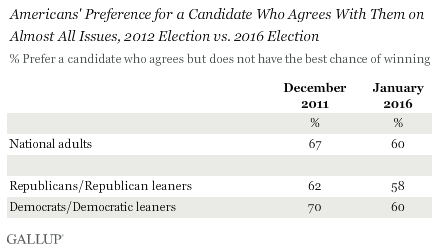
Bottom Line
As they did in the previous presidential election, Americans today value issue agreement over electability -- and the way the 2016 primaries are playing out so far reflects this preference for issues rather than potential viability in the November general election.
The preference for a nominee with greater issue agreement can prove challenging for "establishment" candidates like Clinton, former Gov. Jeb Bush and Sen. Marco Rubio. Each walks a shaky political tightrope on myriad issues in an effort not to alienate key voting blocs -- compared with some of their competitors who don't seem to shy away from divisive positions that could complicate their chances in a general election.
For Republicans, their party in 2016 has had one of its largest fields in modern political history, and with that, a wide spectrum of candidates and issue positions to select from. This complicates the GOP's ultimate goal of winning the general election, because Republicans and Republican-leaning independents may prefer candidates whom they find most agreeable now, but will in the end want a candidate who can win in November.
Democrats face a similar conundrum -- one that consists of only two candidates, but is arguably just as divisive for their party. The recent Iowa caucuses highlighted a sharp divide among Democratic voters, and raised the question of what these voters truly value in a candidate -- and whether they even believe that Clinton is more electable than Sanders.
These data are available in Gallup Analytics.
Survey Methods
Results for this Gallup poll are based on telephone interviews conducted Jan. 21-25, 2016, with a random sample of 1,022 adults, aged 18 and older, living in all 50 U.S. states and the District of Columbia. For results based on the total sample of national adults, the margin of sampling error is ±4 percentage points at the 95% confidence level. All reported margins of sampling error include computed design effects for weighting.
Each sample of national adults includes a minimum quota of 60% cellphone respondents and 40% landline respondents, with additional minimum quotas by time zone within region. Landline and cellular telephone numbers are selected using random-digit-dial methods.
View complete question responses and trends.
Learn more about how Gallup Poll Social Series works.
